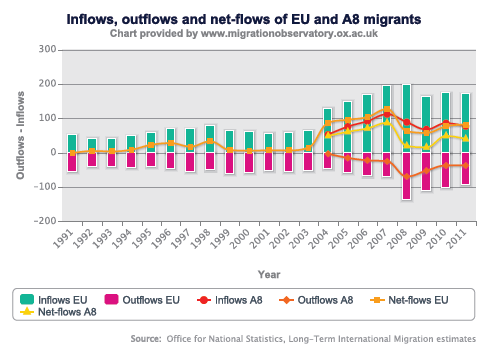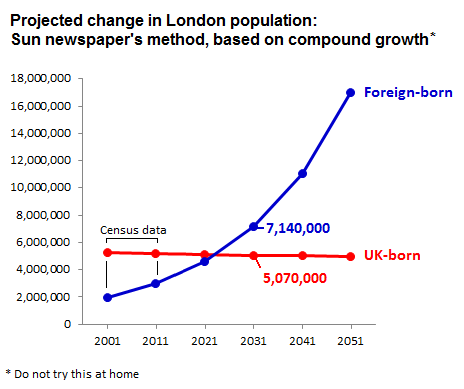Will London be mostly foreign by 2031?
This article has been updated, see below

The Sun, 20 May 2013
British-born Londoners reading this morning's Sun were greeted with the prospect of being in a minority in less than 20 years.
According to the paper's headline, by 2031 the capital will be populated by more "foreigners" than "Brits". However rather than reporting on the population of foreign nationals, the article actually focused entirely on foreign born residents. For instance, London Mayor Boris Johnson is a British national, but also foreign-born, so he'd be one of the 7 million 'foreigners' on this definition.
The subheading reads: "Oxford University population research prediction", referring to Oxford University's Migration Observatory research group. They released a briefing this morning on London's population statistics as revealed by the 2011 Census.
However, a look at the briefing note itself reveals no such prediction was made by the Observatory - the document presents an account of the current population profile of London and compares this to 2001. No attempt is made at a projection into the future.
Further into the article, the Sun explains that:
"That estimate, calculated by The Sun, does not take into account any possible change in Government policy or external factors such as war overseas."
So does the Sun's calculation make sense?
Making projections is a delicate business given that there's not necessarily any reason to assume that the rate of change over any given period of time is going to remain the same in the future. The obvious problems with the Sun's method are the very caveats the paper announces: it doesn't take into account policy changes, nor does it account for external factors.
Yet, the Coalition Agreement has already made clear the government's commitment to reduce net migration to the "tens of thousands", so we ought to expect some change in the rate because of this. In fact, the evidence already suggests that non-British immigration is falling. On a rolling 12-month measure, the Office for National Statistics (ONS) has detected falling levels for five quarters in a row.
What's more, we might be more concerned about external factors than the Sun appears to give credit for. In the last decade the UK has seen increased migration inflows as a result of the accession of new countries into the European Union.
The graph below from the Migration Observatory captures the boost to EU flows from 2004 onwards:

While there may be new 'boosts' to UK migration in the future (restrictions on migration from Romanian and Bulgaria will be lifted next year, for a start), it's clearly unrealistic to account for this over an 18 year period, especially considering the EU expansion over the last decade has been historically unusual.
It seems that the Sun's method of calculating the figures is through reapplying the growth in foreign-born Londoners (54% over a decade) and the decline of UK-born London residents (-1% over a decade).
Sure enough, doing this gets us to 7 million foreign-born and 5 million UK born workers by 2031. However, this estimate starts to get out of hand very quickly, showing increasingly implausible numbers further into the future:

Using a more simple assumption - although there's no more reason to think it's valid - that the same number change in UK- and foreign-born residents over the last decade will continue over future decades keeps the numbers more controlled: both UK- and foreign-born populations hit about 5 million in 2031.
In any case, while the Sun points out the limitations of its own estimate, these limitations are far too large to ignore. To attempt to project future migration without accounting for policy changes, external events, or even recent trends over the past year is bound to paint a simplistic and misleading picture for readers. As such, we'll be asking the Sun to correct its article.
This article was updated on 21 May to reflect the distinction between foreign nationals and foreign born residents which was not initially made clear.